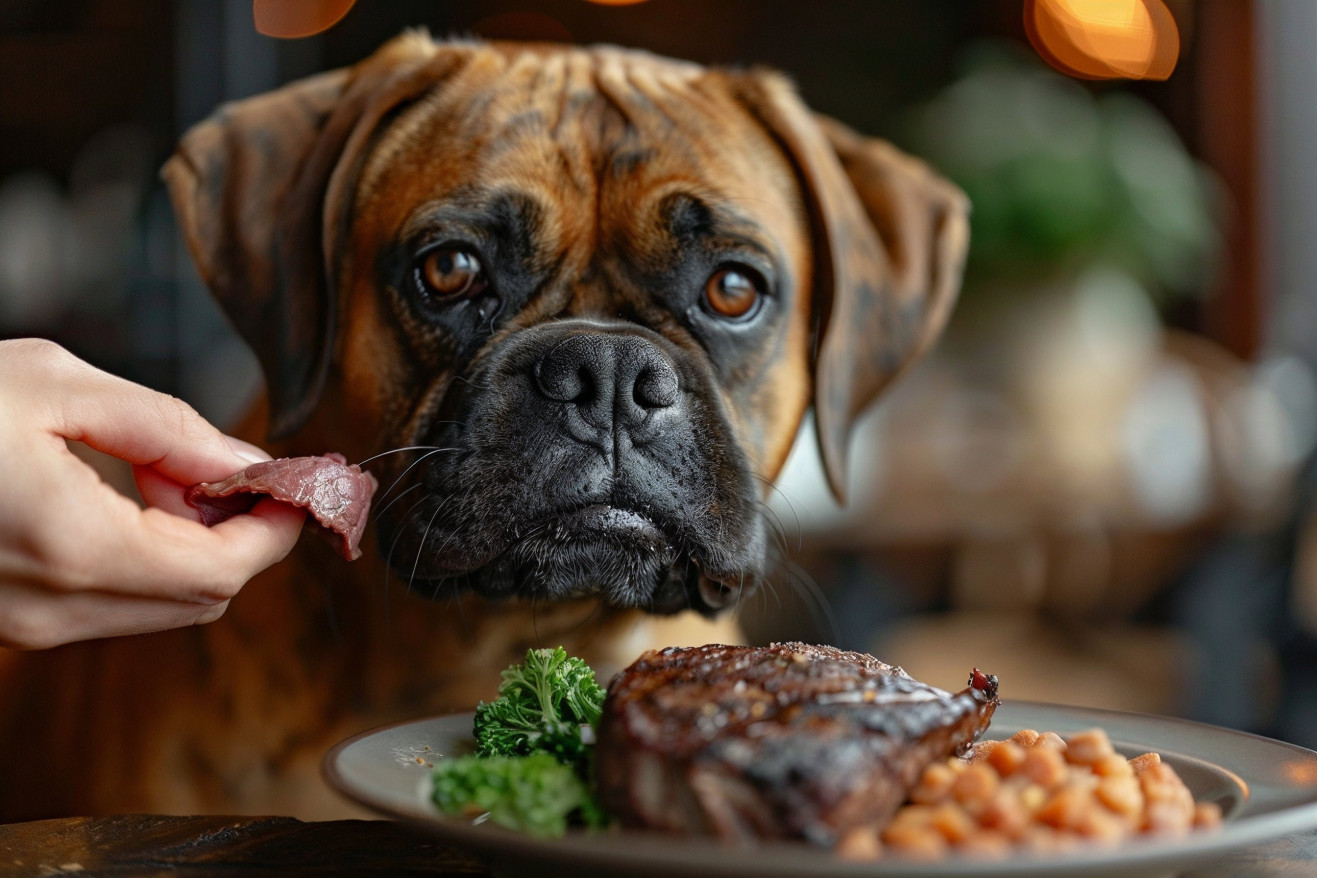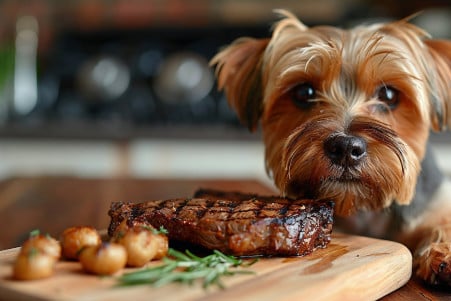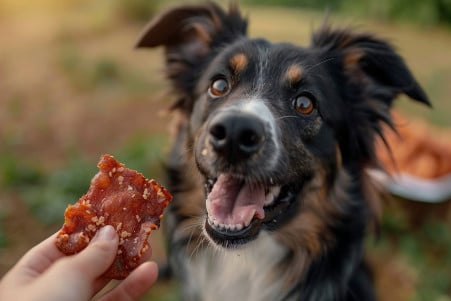Can Dogs Eat Roast Beef? Safe Serving Tips for Pet Owners
11 March 2024 • Updated 10 March 2024

It can be difficult to ignore your dog’s big, sad eyes when you’re eating dinner, but can you give in and feed them roast beef? While it’s important to keep portion sizes in check, dogs can eat roast beef as long as it’s prepared simply and doesn’t include any seasonings that are toxic to dogs, like onion or garlic.
It’s also a good source of protein and other important vitamins and minerals that dogs need. That said, it’s important to stay away from fatty options and too much salt to avoid health problems like pancreatitis and hypertension.
Throughout our in-depth investigation, we’ll look at nutritional breakdowns, advice from veterinarians, and research on canine nutrition to help you understand what it means to feed your dog roast beef. We’ll cover the pros and cons of feeding your dog roast beef from a scientific standpoint, so you can be sure you have a comprehensive, evidence-based understanding that will help you make the best choices for your dog’s health and happiness.
Can dogs eat roast beef?
Nutritional Value of Roast Beef for Dogs
In addition to being a delicious treat for people, dogs can also reap the benefits of roast beef’s nutritional value. Roast beef is a great source of protein, which is important for building and maintaining strong muscles and supporting other important bodily functions in dogs.
Meanwhile, the iron in roast beef is necessary for oxygen transport in the blood, and B vitamins, especially B12 and B6, are important for the nervous system and metabolism. As noted in Hepper, these vitamins and minerals can help with everything from a dog’s coat to their immune system.
That said, it’s important to note the high fat and sodium levels in roast beef. As pointed out by Daily Paws, fatty roast beef can lead to pancreatitis and too much salt can cause health problems like high blood pressure. Meanwhile, Raised Right Pets notes that it’s best to feed dogs roast beef in moderation and that lean beef that’s been boiled or steamed is a healthier option.
To make sure that you don’t overdo it, make sure to feed your dog small, occasional servings of roast beef. It’s also important to make sure that the roast beef is part of a balanced diet, as too much can lead to nutritional deficiencies and health issues.
Meeting Your Dog’s Nutritional Needs
Like humans, dogs need a balanced diet to stay healthy. According to VCA Animal Hospitals, a balanced diet for dogs should include proteins, fats, carbohydrates, minerals, vitamins, and water.
The Association of American Feed Control Officials (AAFCO) sets standards for pet food to make sure that it meets the nutritional needs of dogs at different life stages. As a protein, roast beef can help dogs maintain their muscles and overall health as part of a balanced diet, but it should not be the only source of nutrition.
According to PetMD, a dog’s diet should be based on their specific energy needs, which depend on their size, age, and how active they are. For example, the energy needs of a puppy are much different than those of an older dog. AAFCO-regulated diets take this into account and provide standards for nutritionally complete food that will help dogs grow and maintain their health.
For more personalized diet recommendations, pet owners can turn to their vets. Vets can offer personalized recommendations based on a dog’s specific needs, including their breed and any health conditions they may have. With this kind of personalized guidance, pet owners can make sure that roast beef and other foods they feed their dogs will help them stay healthy without leading to nutritional imbalances.
In summary, while roast beef can be a healthy addition to a dog’s diet, it’s important to make sure that it’s part of a balanced diet that meets the dog’s specific needs.
How to Work Around Beef Allergies in Dog Diets
While beef is a common ingredient in many dog foods, it is also a common allergen. VCA Animal Hospitals explains that the signs of a food allergy in dogs can include everything from skin irritations and inflamed paws to gastrointestinal problems like vomiting and diarrhea. These reactions are the result of the immune system’s response to proteins that it sees as foreign.
Veterinarians will diagnose a beef allergy through the use of an elimination diet and a lot of owner involvement. The elimination diet removes the most common allergens from a dog’s diet and then has the owner monitor the dog’s symptoms for changes. A study in PMC explains that if the dog’s symptoms go away and then come back when beef is reintroduced, it can be a sign that the dog has a beef allergy.
For dogs with beef allergies, it can be helpful to turn to alternative protein sources like duck, fish, or novel proteins like kangaroo. To help avoid and manage food allergies, Wag Walking recommends rotating through several different proteins.
It’s also important to watch for signs of an allergic reaction when you introduce any new food, including roast beef, to your dog’s diet. This will help ensure that you’re meeting their dietary needs while also keeping them safe.
Cooking a Roast Beef for Dogs
The nutritional impact of cooking a roast beef for dogs is significant. One study published in PMC found that cooking beef at temperatures above 120C leads to the formation of heterocyclic aromatic amines (HAAs). These compounds have been classified as potential human carcinogens by the International Agency for Research on Cancer and could potentially have a similar impact on dogs.
Meanwhile, another study published in Meat Science found that cooking beef, and especially roasting it, leads to a loss of minerals and certain vitamins, with thiamine being the most affected.
This change in the nutritional content of the meat is important to keep in mind when feeding roast beef to dogs. To ensure that the meat maintains its nutritional content while minimizing the risk of harm, it’s important to cook the meat using a gentle cooking method at a lower temperature to minimize the formation of harmful substances.
When deciding between feeding dogs raw or cooked beef, it’s important to remember that raw meat can be contaminated with bacteria, which cooking can help eliminate. However, it’s important to remember that dogs can’t eat certain seasonings, including onions and garlic, and to make sure that the meat is cooked enough to be safe without losing its nutritional value.
By doing this, you can make sure that roast beef can be a healthy addition to your dog’s diet as you continue to assess its impact on their overall health.
Final Thoughts on Can Dogs Eat Roast Beef?
So, can dogs eat roast beef? Yes, but it’s important to make sure that you’re feeding it to your dog in a way that is safe and healthy. When given in moderation and with the right preparation, roast beef can be a great source of protein and other nutrients for your dog.
Roast beef is a good source of protein, vitamins, and minerals that are important for your dog’s health, so it definitely has value when fed in moderation. However, it’s important to make sure that the roast beef is prepared in a way that is free from harmful additives and seasonings and that you’re avoiding high-fat and high-sodium options to prevent potential health issues.
As always, it’s important to talk to your vet before making any changes to your dog’s diet, including adding roast beef. This will help ensure that the roast beef (or any other new food) is appropriate for your dog’s individual dietary needs. It’s also important to watch for signs of an allergic reaction, especially since beef is a common allergen in dogs.
In conclusion, when fed in moderation and as part of a well-rounded diet, roast beef can be a healthy addition to your dog’s meals. However, it’s important to make sure that you’re feeding it in moderation and keeping a close eye on your dog to make sure that it’s not causing any health issues.


